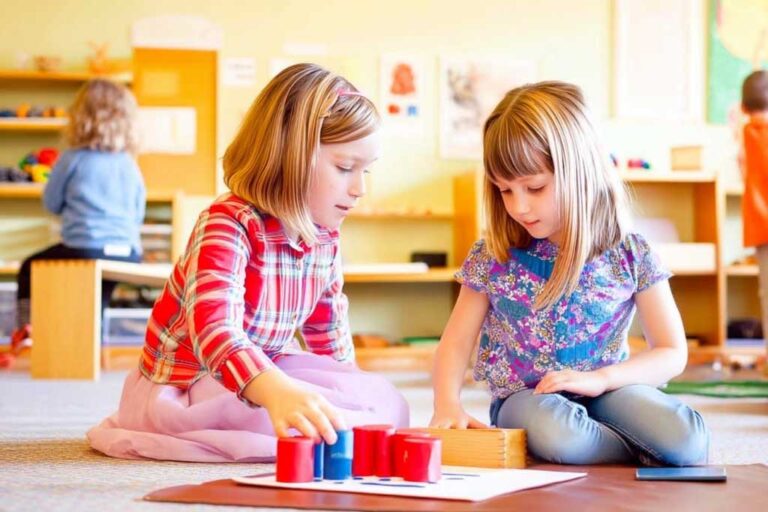When parents research educational options for their children, they often wonder which approach will best prepare their little ones for academic success and life beyond the classroom. Recent scientific studies reveal compelling evidence that Montessori education delivers exceptional outcomes across multiple areas of child development.
A groundbreaking meta-analysis examining 32 studies across eight countries found “strong and clear effects” of Montessori education on both academic performance and social-emotional growth. These findings validate what Dr. Maria Montessori discovered over a century ago: children learn best when they can explore, choose, and engage with their environment naturally. For families seeking trusted Montessori education in San Antonio, understanding these research-backed benefits can help guide this important decision.
Academic Excellence That Lasts
The most striking research findings center on academic performance. Children in Montessori programs consistently outperform their traditionally-educated peers in mathematics, literacy, and general academic ability. The strongest gains appear during kindergarten and first grade, when foundational learning patterns take root.
Unlike traditional classrooms where children memorize facts for tests, Montessori students develop deep understanding through hands-on exploration. When a child uses golden beads to learn addition, they’re not just memorizing numbers—they’re building concrete understanding of mathematical concepts that will serve them throughout their education.
This approach creates lasting impact. Research tracking students longitudinally shows that children who attended Montessori programs continue demonstrating superior academic performance through high school. They score higher on standardized assessments and develop stronger critical thinking abilities compared to control groups from traditional educational settings.
The secret lies in executive function development. Self-directed learning activities strengthen children’s ability to plan, focus attention, and manage multiple tasks—skills that become increasingly valuable as academic demands grow more complex.
Social and Emotional Growth
Beyond academics, Montessori education excels at developing emotional intelligence and social skills. The mixed-age classroom structure creates natural mentoring opportunities where older children guide younger ones while developing leadership abilities themselves.
Children learn conflict resolution through guided peer interactions rather than adult intervention. When disagreements arise, teachers help students communicate their feelings and find solutions together. This process builds empathy, patience, and communication skills that benefit children throughout their lives.
The emphasis on choice and independence also strengthens emotional regulation. When children can select activities that match their interests and developmental needs, they experience less frustration and more engagement. This autonomy builds confidence and intrinsic motivation—qualities that research links to better mental health outcomes in adulthood.
Practical life activities like preparing snacks, caring for plants, or organizing materials teach responsibility while building fine motor skills. These seemingly simple tasks develop concentration, coordination, and pride in contributing to their community.
Building Independence and Confidence
Perhaps the most distinctive aspect of Montessori education is its focus on developing independent, confident learners. Children as young as three learn to make meaningful choices about their learning, manage their time, and take responsibility for their actions.
This independence doesn’t happen overnight. Teachers carefully prepare environments with age-appropriate materials and activities, then step back to observe and guide rather than direct. Children learn through trial and error, developing resilience and problem-solving abilities that serve them well beyond the classroom.
Research shows this approach builds remarkable persistence. Montessori students are more likely to stick with challenging tasks and view mistakes as learning opportunities rather than failures. They develop what researchers call a “growth mindset”—the belief that abilities can be developed through effort and practice.
What Makes Montessori Different
The effectiveness of Montessori education stems from its child-centered philosophy. Rather than forcing all children to learn the same material at the same pace, Montessori respects individual developmental timelines and learning styles.
Specialized materials play a key role. Each Montessori material isolates specific concepts, allowing children to explore and master skills through repetition and discovery. The pink tower teaches size discrimination, the red rods develop visual perception of length, and the sandpaper letters provide tactile reinforcement for letter recognition.
Trained Montessori educators act as guides rather than traditional teachers. They observe each child carefully, introducing new materials when the child shows readiness and interest. This individualized approach ensures children are neither bored by material that’s too easy nor frustrated by concepts beyond their current understanding.
Proven Results in San Antonio
Country Day Montessori has demonstrated these benefits for over four decades, serving San Antonio families since 1983. Their Cognia accreditation validates their commitment to educational excellence and continuous improvement.
Alumni consistently gain acceptance to competitive programs including Texas Military Institute, charter schools, and gifted programs. Parents report that their children maintain the confidence, independence, and love of learning developed during their Montessori years.
The school’s 4.5-acre campus with butterfly greenhouse, gardens, and animals provides rich opportunities for outdoor learning that enhances academic concepts while connecting children to nature—an element research shows supports healthy development.
The Research Speaks
Multiple studies confirm that Montessori students demonstrate superior outcomes across academic, social, and emotional measures. They show better academic performance, stronger social skills, greater creativity, and improved executive function compared to peers in traditional programs.
These benefits extend well into adulthood. Longitudinal research reveals that Montessori graduates report higher levels of well-being, better social relationships, and greater career satisfaction than those educated in traditional settings.
The evidence is clear: Montessori education works because it aligns with how children naturally learn and develop. By respecting children’s innate curiosity and providing carefully prepared environments for exploration, Montessori schools nurture confident, capable, and caring individuals.
For parents considering educational options, the research provides compelling evidence that authentic Montessori education offers children the best foundation for academic success and lifelong learning. The investment in this approach pays dividends that last far beyond the school years, shaping children into thoughtful, capable adults ready to contribute positively to their communities.









